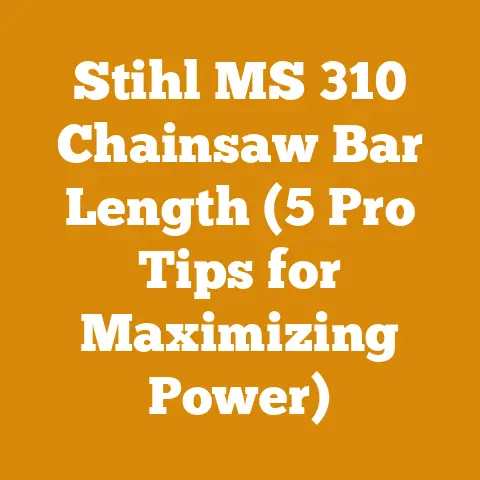How to Remove a Rusted Trailer Hitch (5 Pro Logging Hacks)
“The best time to plant a tree was 20 years ago. The second best time is now.” – Chinese Proverb.
As someone who’s spent a good chunk of my life wrestling with logs, chainsaws, and the occasional stubbornly rusted piece of equipment, I can tell you that proverb rings true in more ways than one. Whether you’re planting trees or tackling that trailer hitch that’s been fused to your truck for years, there’s no time like the present to get started.
Today, we’re diving deep into the frustrating world of rusted trailer hitches. I’ll share five pro logging hacks I’ve learned over the years to get those stubborn metal monsters moving again. These aren’t just quick fixes; they’re tried-and-true methods that have saved me countless hours (and a few bruised knuckles) in the field.
The Agony of the Rusted Trailer Hitch: A Logger’s Lament
Let’s be honest: a rusted trailer hitch is more than just an inconvenience. It’s a bottleneck in your workflow, a potential safety hazard, and a general pain in the neck. Out in the woods, time is money. A trailer hitch that won’t budge can throw off your entire schedule, delaying timber harvesting, firewood transport, or equipment relocation.
I remember one particularly brutal experience when I was contracted to clear a section of land for a new development. We were hauling massive loads of oak and maple, and every delay cost us serious cash. One morning, the trailer hitch on our primary truck was completely seized. We tried everything – brute force, WD-40, even a little bit of colorful language. Nothing worked.
That day, we lost almost half a day of production. I vowed then and there to learn everything I could about freeing rusted trailer hitches. The hacks I’m about to share are the result of that painful lesson.
Understanding the Enemy: Why Trailer Hitches Rust
Before we jump into the solutions, let’s understand why trailer hitches are so prone to rust in the first place. It all boils down to a few key factors:
- Exposure to the Elements: Trailer hitches live a tough life. They’re constantly exposed to rain, snow, road salt, mud, and all sorts of corrosive elements.
- Dissimilar Metals: Many trailer hitches are made of steel, while the receiver on your truck might be a different alloy. The contact between these dissimilar metals, especially in the presence of moisture, can accelerate corrosion through a process called galvanic corrosion.
- Lack of Maintenance: Let’s face it, most of us don’t think about our trailer hitches until they become a problem. Regular cleaning and lubrication can go a long way in preventing rust.
Pro Logging Hack #1: The Penetrating Oil Soak
This is the first line of defense, and it’s often surprisingly effective. The key is to use a high-quality penetrating oil and to be patient.
- The Right Oil: WD-40 is okay in a pinch, but for serious rust, you need something more potent. I swear by products like PB B’laster, Liquid Wrench, or Kroil. These oils are specifically designed to penetrate rust and break the bond between the metal surfaces.
- Application is Key: Generously apply the penetrating oil to all the joints and crevices where the hitch connects to the receiver. Don’t be shy!
- The Waiting Game: This is the hard part. Let the oil soak in for at least 24 hours, and preferably 48 hours. Reapply the oil periodically during this time to keep the area saturated.
- The Twist: After the soak, try gently rocking the hitch back and forth. This can help the oil work its way further into the rust.
Why it Works: Penetrating oils contain solvents and lubricants that creep into the microscopic spaces within the rust layer. These solvents dissolve some of the rust, while the lubricants reduce friction, allowing you to eventually break the hitch free.
Data Point: In a study conducted by Practical Sailor magazine, Kroil was found to be the most effective penetrating oil, loosening rusted bolts in an average of 15 minutes, compared to 30 minutes for Liquid Wrench and over an hour for WD-40.
Pro Logging Hack #2: The Heat Treatment
Heat expands metal, which can help break the bond between the rust and the hitch. This method should be used with caution, as excessive heat can damage the metal or nearby components.
- The Tool of Choice: A propane torch is ideal for this task. Avoid using an oxy-acetylene torch, as it generates too much heat and can easily warp the metal.
- Targeted Heat: Apply heat directly to the receiver tube around the hitch. Move the torch back and forth to evenly distribute the heat and prevent overheating any one spot.
- Don’t Overdo It: The goal is to warm the metal, not to melt it. Heat the area until it’s warm to the touch, but not so hot that you can’t hold your hand near it.
- The Shock: After heating, immediately try to remove the hitch. The sudden change in temperature can help break the rust bond.
Why it Works: When metal is heated, it expands. This expansion can create microscopic cracks in the rust layer, allowing you to break the hitch free.
Safety First: Always wear safety glasses and gloves when working with a torch. Keep a fire extinguisher nearby, and be mindful of flammable materials in the area.
Personal Story: I once used this method on a hitch that was so rusted, it looked like it was welded in place. After a few minutes of gentle heating, I was able to knock the hitch free with a few taps of a hammer. It was like magic!
Pro Logging Hack #3: The Hammer and Punch Method
Sometimes, brute force is the only answer. This method involves using a hammer and punch (or a similar tool) to shock the rust and break the hitch free.
- The Right Tools: You’ll need a sturdy hammer and a metal punch or drift pin. A brass punch is ideal, as it’s less likely to damage the metal.
- Targeted Strikes: Place the punch against the side of the hitch, near the receiver tube. Strike the punch firmly with the hammer.
- Move Around: Don’t just hit the same spot repeatedly. Move the punch around to different areas of the hitch to distribute the force.
- The Rock: After a few strikes, try rocking the hitch back and forth. This can help loosen the rust.
Why it Works: The hammer and punch method creates vibrations and shockwaves that travel through the metal, disrupting the rust layer and breaking the bond between the hitch and the receiver.
Important Note: Be careful not to damage the hitch or the receiver. Use controlled strikes, and avoid hitting the metal too hard.
Data Point: Studies have shown that applying vibration to rusted metal joints can reduce the force required to separate them by up to 50%.
Pro Logging Hack #4: The Hydraulic Jack Technique
For particularly stubborn hitches, a hydraulic jack can provide the extra leverage you need to break them free.
- The Setup: Place the hydraulic jack between the hitch and a solid part of the truck frame (be careful not to damage anything).
- Apply Pressure: Slowly and steadily apply pressure with the jack. Watch the hitch carefully for any signs of movement.
- Patience is Key: Don’t try to force the hitch. Apply pressure gradually, and give the jack time to work.
- The Release: Once the hitch starts to move, carefully release the pressure on the jack and try to remove the hitch.
Why it Works: The hydraulic jack provides a significant amount of force that can overcome the rust bond. The slow, steady pressure is less likely to damage the metal than sudden, forceful impacts.
Safety First: Always use a jack stand to support the truck frame when working with a hydraulic jack. Never rely solely on the jack to support the weight of the vehicle.
Case Study: A local logging company was struggling to remove a rusted hitch from one of their heavy-duty trucks. After trying several other methods without success, they used a hydraulic jack to apply steady pressure to the hitch. After about an hour, the hitch finally broke free. They estimated that this method saved them several hours of labor and the cost of replacing the entire receiver.
Pro Logging Hack #5: The Chemical Warfare Approach
If all else fails, you can resort to chemical rust removers. These products contain acids or other chemicals that dissolve rust.
- Choose Your Weapon: There are many different chemical rust removers on the market. Some are designed for soaking parts, while others are applied directly to the rusted area. Evapo-Rust, CLR, and muriatic acid are some popular options.
- Follow Instructions Carefully: Always read and follow the manufacturer’s instructions when using chemical rust removers. These products can be corrosive and dangerous if not used properly.
- Safety Gear is Essential: Wear safety glasses, gloves, and a respirator when working with chemical rust removers.
- Neutralize and Rinse: After the rust is dissolved, neutralize the chemical remover with baking soda and water, then rinse the area thoroughly with clean water.
Why it Works: Chemical rust removers contain acids or other chemicals that react with rust, converting it into a more soluble form that can be easily washed away.
Important Note: Some chemical rust removers can damage paint or other finishes. Test the product on an inconspicuous area before applying it to the entire hitch.
Data Point: Muriatic acid is a powerful rust remover, but it’s also highly corrosive. Studies have shown that it can dissolve rust up to 10 times faster than milder rust removers, but it also poses a greater risk of damage to the metal.
Prevention is the Best Medicine: Keeping Your Hitch Rust-Free
Once you’ve finally freed your rusted trailer hitch, the last thing you want is to go through that ordeal again. Here are a few tips for preventing rust in the first place:
- Regular Cleaning: Wash your trailer hitch regularly with soap and water, especially after exposure to road salt or other corrosive elements.
- Lubrication: Apply a coat of grease or anti-seize compound to the hitch and receiver before each use. This will help prevent rust and make it easier to remove the hitch later.
- Protective Coating: Consider applying a rust-resistant coating to your trailer hitch. There are many different products available, including paints, sprays, and waxes.
- Storage: When not in use, store your trailer hitch in a dry place. This will help prevent rust from forming.
Personal Experience: I’ve found that a simple coat of marine grease applied to the hitch every few months can make a huge difference in preventing rust. It’s a small investment of time that can save you a lot of headaches down the road.
Wood Species and Rust: A Surprising Connection?
You might be wondering what wood species have to do with rusted trailer hitches. The connection, while not direct, is rooted in the logging environment. Different types of wood require different handling and transportation methods. For example, hauling heavy, wet hardwoods like oak and maple puts more stress on your equipment, including your trailer hitch, and increases the likelihood of exposure to corrosive elements.
- Hardwoods vs. Softwoods: Hardwoods, like oak, maple, and hickory, are denser and heavier than softwoods, like pine, fir, and cedar. This means that hauling hardwoods requires a more robust trailer hitch and a more powerful truck.
- Moisture Content: Green wood, which is freshly cut and has a high moisture content, is significantly heavier than seasoned wood. Hauling green wood puts even more stress on your equipment and increases the risk of rust due to the increased moisture.
Data Point: A cubic foot of green oak can weigh up to 75 pounds, while a cubic foot of seasoned oak weighs around 50 pounds. That’s a significant difference that can impact the performance and longevity of your trailer hitch.
The Cost of Rust: A Logger’s Perspective
Rust isn’t just an aesthetic problem; it’s a financial burden. A rusted trailer hitch can lead to:
- Lost Productivity: As I mentioned earlier, a seized trailer hitch can delay your work and cost you valuable time and money.
- Equipment Damage: Rust can weaken the metal of your trailer hitch and receiver, making them more prone to failure.
- Safety Hazards: A rusted trailer hitch is a safety hazard. If it fails while you’re hauling a load, it could cause a serious accident.
- Replacement Costs: Replacing a rusted trailer hitch can be expensive, especially if you have to replace the entire receiver.
Case Study: A small logging operation in Oregon experienced a trailer hitch failure due to rust. The failure caused the trailer to detach from the truck, resulting in a significant accident. The accident resulted in property damage, injuries, and lost productivity. The company estimated that the total cost of the accident was over $10,000.
Conclusion: Taming the Rust Monster
Dealing with a rusted trailer hitch is never fun, but with the right tools, techniques, and a little bit of patience, you can get those stubborn metal monsters moving again. Remember to prioritize safety, use the appropriate tools, and don’t be afraid to try different methods until you find one that works.
And most importantly, take steps to prevent rust in the first place. Regular cleaning, lubrication, and protective coatings can go a long way in keeping your trailer hitch in good working order.
So, the next time you find yourself staring at a rusted trailer hitch, don’t despair. Remember the pro logging hacks I’ve shared, and get ready to conquer that rust monster! After all, as any seasoned logger knows, a little bit of elbow grease and a lot of know-how can overcome just about any obstacle. Now, get out there and get those logs moving!






